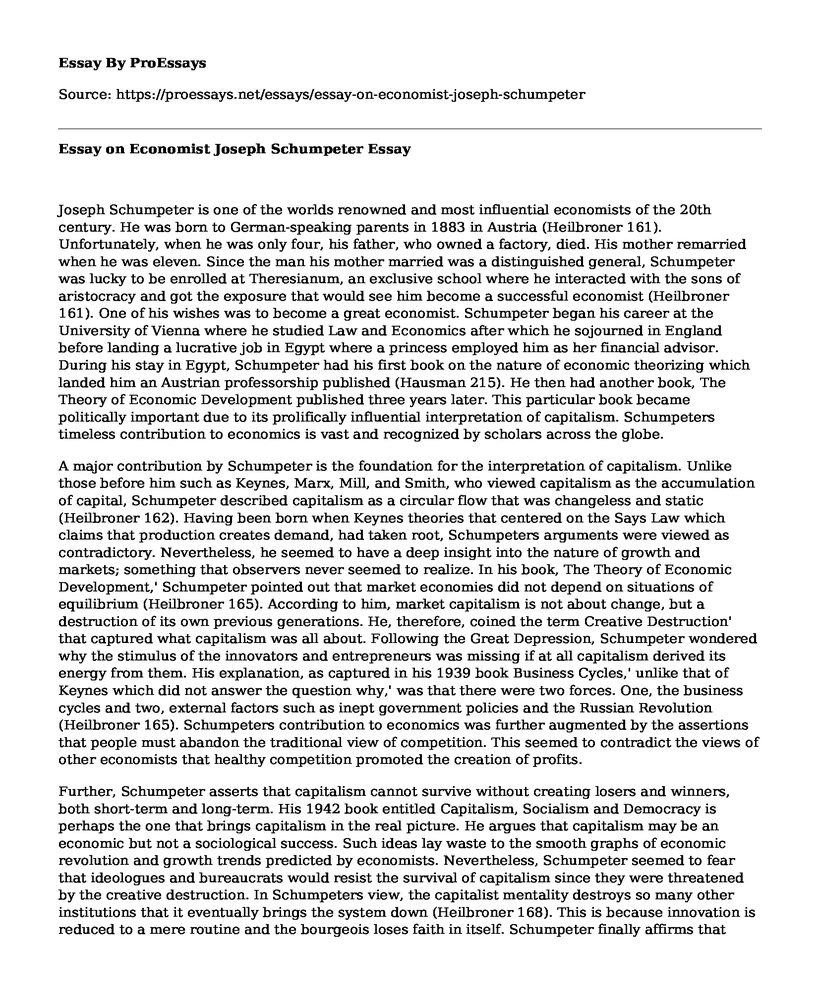Joseph Schumpeter is one of the worlds renowned and most influential economists of the 20th century. He was born to German-speaking parents in 1883 in Austria (Heilbroner 161). Unfortunately, when he was only four, his father, who owned a factory, died. His mother remarried when he was eleven. Since the man his mother married was a distinguished general, Schumpeter was lucky to be enrolled at Theresianum, an exclusive school where he interacted with the sons of aristocracy and got the exposure that would see him become a successful economist (Heilbroner 161). One of his wishes was to become a great economist. Schumpeter began his career at the University of Vienna where he studied Law and Economics after which he sojourned in England before landing a lucrative job in Egypt where a princess employed him as her financial advisor. During his stay in Egypt, Schumpeter had his first book on the nature of economic theorizing which landed him an Austrian professorship published (Hausman 215). He then had another book, The Theory of Economic Development published three years later. This particular book became politically important due to its prolifically influential interpretation of capitalism. Schumpeters timeless contribution to economics is vast and recognized by scholars across the globe.
A major contribution by Schumpeter is the foundation for the interpretation of capitalism. Unlike those before him such as Keynes, Marx, Mill, and Smith, who viewed capitalism as the accumulation of capital, Schumpeter described capitalism as a circular flow that was changeless and static (Heilbroner 162). Having been born when Keynes theories that centered on the Says Law which claims that production creates demand, had taken root, Schumpeters arguments were viewed as contradictory. Nevertheless, he seemed to have a deep insight into the nature of growth and markets; something that observers never seemed to realize. In his book, The Theory of Economic Development,' Schumpeter pointed out that market economies did not depend on situations of equilibrium (Heilbroner 165). According to him, market capitalism is not about change, but a destruction of its own previous generations. He, therefore, coined the term Creative Destruction' that captured what capitalism was all about. Following the Great Depression, Schumpeter wondered why the stimulus of the innovators and entrepreneurs was missing if at all capitalism derived its energy from them. His explanation, as captured in his 1939 book Business Cycles,' unlike that of Keynes which did not answer the question why,' was that there were two forces. One, the business cycles and two, external factors such as inept government policies and the Russian Revolution (Heilbroner 165). Schumpeters contribution to economics was further augmented by the assertions that people must abandon the traditional view of competition. This seemed to contradict the views of other economists that healthy competition promoted the creation of profits.
Further, Schumpeter asserts that capitalism cannot survive without creating losers and winners, both short-term and long-term. His 1942 book entitled Capitalism, Socialism and Democracy is perhaps the one that brings capitalism in the real picture. He argues that capitalism may be an economic but not a sociological success. Such ideas lay waste to the smooth graphs of economic revolution and growth trends predicted by economists. Nevertheless, Schumpeter seemed to fear that ideologues and bureaucrats would resist the survival of capitalism since they were threatened by the creative destruction. In Schumpeters view, the capitalist mentality destroys so many other institutions that it eventually brings the system down (Heilbroner 168). This is because innovation is reduced to a mere routine and the bourgeois loses faith in itself. Schumpeter finally affirms that capitalism only paves the way for socialism. In that school of thought, social and political matters seem to override the very aspect of economics. In the real sense, although his political judgment seems abysmal, Schumpeters economic theorizing was powerful. He thought that some of the current combinations of political democracies and market economies were not likely to be stable.
Although there were some limitations to Schumpeters works, he made major contributions to the interpretation of capitalism, the understanding of economic growth and crises as well as contributing to the political and economic theory. His assertions naturally developed, justified, rationalized, extended, applied innovative economic outlook, and demonstrated to economists the power of innovation. The point that Schumpeter makes is that capitalism cannot survive in isolation. His seems to be more of a social prognosis as opposed to an economic one. Perhaps his exposure to an aristocracy, his enterprise, and political experiences make him better judge the economic drifts in a way that other worldly philosophers such as Keynes could not. This seems to make him more philosophical towards socialism than the likes of Marx, Adam Smith, and Keynes. Therefore, there seems to be a congruence between historical vision and personal experience within Schumpeter that motivated him to unravel many contradictions within the world of economics.
Works Cited
Hausman, Daniel M. The philosophy of economics: an anthology. Cambridge University Press, 1994.
Heilbroner, Robert L. The worldly philosophers: The lives, times and ideas of the great economic thinkers. Simon and Schuster, 2011.
Cite this page
Essay on Economist Joseph Schumpeter. (2021, Jun 18). Retrieved from https://proessays.net/essays/essay-on-economist-joseph-schumpeter
If you are the original author of this essay and no longer wish to have it published on the ProEssays website, please click below to request its removal:
- Positive and Negative Impacts of a Reduction in Global Oil Price Paper Example
- UAE Changes in Employment Essay Example
- Essay on How to Differentiate Our Company Through Updated Employee Benefits
- Research Paper on Financial Management Challenges
- Performance Management & Appraisal: Aligning Performance With Objectives - Essay Sample
- Gemstone Co. Aligns with OSHA VPP, AIHA Z10 & Identifies Red Flags - Essay Sample
- Essay Example on Unions' Strikes: A Visual Journey







